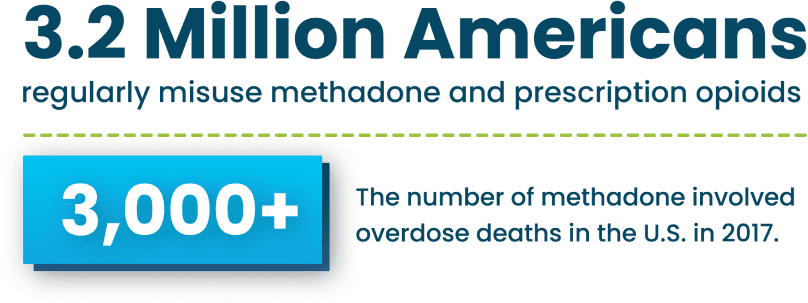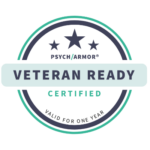Methadone Addiction: Symptoms, Side Effects, and Treatment Services
Methadone is a synthetic opioid agonist that produces effects in the body similar to heroin and morphine. It is taken as a tablet or a syrup, and it helps to relieve opioid cravings or opioid use disorder without causing euphoria.
Methadone is a prescription medicine used in treatment to help individuals who struggle with addiction to heroin, narcotic painkillers, or other opioids. Using methadone also helps individuals to abstain from illicit opioid drugs. The drug also helps people manage cravings and withdrawal symptoms in opioid treatment programs. It is a drug that is part of the National Institute on Drug Abuse, which is part of the United States Department of Health and Human Services. It is part of the treatment of opiate addiction, and it is included in the World Health Organization’s List of Essential Medicines. However, if taken methadone in higher doses, it can cause addiction problems and mental illnesses.
Methadone is a powerful opioid and can be very addictive. The drug can cause a number of problems, including decreased reaction time, reduced attention span, and dry mouth. It also lowers blood pressure and muscle strength. It can also lead to euphoria and paranoia. People addicted to methadone will often continue to use the drug, even in hazardous situations.
How Does a Methadone Dose Work?
Methadone works by binding to the same receptors in the brain as morphine and other opioids. This helps block the euphoric effects of other opiates and makes it easier to cope with the symptoms of withdrawal. In some cases, methadone can be abused by snorting it, injecting it, or taking it orally in liquid form. Methadone maintenance is highly addictive and should be taken under the supervision of a physician.
Treatment Services
A key part of methadone treatment is the supervision of patients taking the medication. This can be done by a nurse or a doctor, or even by a pharmacy but choosing a facility is the best option to treat methadone addiction. At Haven Detox, patients are usually placed in a room where the staff can keep an eye on them, and they must be supervised for at least 15-20 minutes after they take their first dose.
In addition to methadone treatment, other drug abuse treatment options are available to patients who suffer from methadone addiction. It is essential to find a treatment center that offers both medication and counseling services to help people overcome their dependence on methadone.
Haven Detox is one of the best methadone rehab centers provide specialized treatment for patients with this addiction. Our professional doctor’s team can help patients overcome the cravings associated with methadone and help them move toward a meaningful life. The main goal of our treatment is to help individuals regain control of their lives.

Methadone Symptoms and Side Effects
People who are using methadone drug overdose may experience sleepiness, fatigue, and dizziness. If you feel dizzy, it’s important not to drive or ride a bike while on methadone. The following are signs of a methadone overdose:
- Nail and fingernail discoloration
- Breathing depression
- Nausea and diarrhea
- Consciousness loss
- Chronic pain
- Narrowed pupils
- Hypertension
- Dizziness
People may also experience headaches. If you have a headache, drink plenty of water or consult a pharmacist for painkillers. If the headache persists or gets worse, see your doctor.
When methadone addiction is diagnosed, doctors will start by determining the underlying causes of the addiction. Often, people suffering from mental health issues will try to self-medicate by using illicit drugs. In these cases, a psychiatrist will identify underlying mental health issues and provide comprehensive care to treat them as well.
When to Seek Treatment…
People who take methadone need to seek treatment if they start to show the above-described symptoms of addiction. The risk of addiction increases when methadone is combined with other substances, such as alcohol or street drugs. The best way to reduce the risks is to avoid drinking and using alcohol while taking methadone.
There are effective treatment options available for methadone addiction at Haven Detox. An inpatient treatment program requires staying in a facility. This treatment plan allows patients to be monitored by trained medical supervision 24 hours a day. It’s beneficial for people who have a history of addiction or co-occurring disorders or who have had relapses.
If a Loved One Needs Help…
If your loved one or your family members are suffering from methadone addiction, there are several steps you can take to help them get the help they need. The first step is to offer support. Although it may seem difficult to do at first, it is crucial to remain calm and be there for your loved one. If your loved one is able to talk about their addiction, they may be more open to helping you.
You can motivate or help your loved one to seek treatment. By being positive and supportive, you can motivate them to continue on a positive path and stay sober. You can also keep naloxone available at home in case they overdose.

Causes of Methadone Addiction
Methadone is an opioid medication that is commonly prescribed to treat opiate addictions. It works by triggering the opioid receptors in the brain and helps with withdrawal symptoms in addicts. Although the substance is not as addictive as heroin or other addictive drugs, it does have the potential for abuse, especially when used beyond the prescription. While methadone is not illegal, it should only be used in controlled circumstances and to treat serious medical conditions. Methadone is a CNS depressant, which makes it dangerous when used in combination with other depressants, especially alcohol.
A person can become addicted to methadone for a variety of reasons. These include illicit use, addictive potential, and family history. In some cases, the addiction may be genetic. While it is not advisable to quit methadone on your own, it is possible to work with a doctor and continue using the drug under strict professional supervision. You can switch to a different medication if your symptoms improve by consult with your doctor.
Methadone is an opioid painkiller that can be deadly in large doses, especially when used in combination with other opioid painkillers.
Methadone acts on receptors in the brain that control pain perception and can be prescribed for chronic or severe pain. Its addictive potential can make it easy for a person to become addicted to the drug. According to the U.S. Department of Health and Human Services, an estimated two million people in the United States suffer from opioid use disorder (OUD). Treatment for this condition usually involves a combination of medication and behavioral therapy.
Methadone addiction can develop through a number of factors. The drug is readily available and can lead to addiction if a person is exposed to a high dose. It has addictive potential, but unlike other prescription drugs, methadone does not produce euphoric effects. As a result, people who are addicted to methadone may take excessive doses in an effort to compensate for the lack of euphoric effects. A methadone overdose can result in symptoms such as constipation, nausea, vomiting, and heart palpitations. A person may also experience weakness, blue fingernails, and lips.
In addition, methadone can have negative side effects when taken with alcohol or other depressants. Alcohol addiction and methadone can also lead to respiratory depression and dangerously low blood pressure. In addition, a person may become physically dependent on methadone if they have a history of substance abuse.
Despite the risks, there are ways to prevent methadone addiction. First, the patient should be honest about other medications they are taking. Secondly, they should avoid mixing methadone with alcohol. This is dangerous because it will reduce its effectiveness. Thirdly, it is important to learn the warning signs of relapse. These signs can include fantasizing about the use of drugs in the past or thinking about relapse. Also, proper nutrition helps strengthen the resistance to relapse.

Risk Factors of Methadone Addiction
The availability of drugs, peer pressure, and genetics all increase the risk of addiction. Those who are at high risk include those with a history of substance abuse, Native Americans, and teenagers. Peer pressure and stress can increase addiction, as can early exposure to drugs. Teens are especially vulnerable to drug use, as they tend to engage in risky behavior. Drugs can alter brain chemistry, altering the way that we think and feel.
Methadone addiction can be a serious problem for both patients and health care providers. While many studies have indicated that methadone can help people overcome their addiction, other studies have not yet found that it can help reduce the number of overdose deaths. One study even found that methadone addiction is associated with an increased risk of death from overdose. However, more research is needed to understand which risks are associated with methadone use and addiction. Some of the risk factors which you need to know are drug availability, peer pressure, and lack of supervision.
Psychologists and researchers have noted a recent spike in substance use in the area. This may be a result of the opioid pandemic, as people may have begun using drugs they did not previously use. Additionally, Washington state has experienced a rise in fentanyl use, a synthetic opioid that is increasingly produced illicitly. However, precise data are hard to obtain.
A person may be susceptible to methadone addiction if they suffer from mental health problems. The drug is often used to numb painful emotions but can worsen the condition. Peer pressure is also an important factor, particularly for young people.
Often, people struggling with addiction deny that the use of drugs is harmful and are reluctant to seek treatment. A structured intervention provides an opportunity for change and can motivate the person to seek treatment. The intervention may be conducted by family members or friends or by a professional. A person’s family situation and lack of parental supervision can also increase the risk of drug use.
A woman who is pregnant may be at increased risk for methadone addiction because of untreated opioid addiction. This type of addiction has been linked to a variety of birth defects, including intrauterine passage of meconium 30 and fetal growth restriction. A woman with an untreated opioid addiction also is more likely to engage in high-risk activities such as prostitution and drug dealing. These behaviors can also cause a woman to lose child custody and even lead to criminal proceedings.

Effects of Methadone Addiction
The use of methadone therapy is not recommended for everyone, and not all clinics offer this treatment. There are many other drugs available to treat opioid dependence. Those who need methadone should discuss their treatment options with a counselor. There are several disadvantages to using this drug. Methadone addiction has a severe effect on your health, safety, employment, and relationships.
One of the disadvantages of methadone is that it is difficult to quit. Although it is not as addictive as heroin, the withdrawal period can be painful and difficult. You may experience nausea, sweating, irritability, anxiety, and lack of pleasure. Methadone treatment centers provide daily doses of methadone to people in recovery. If you are facing any of the above side effects, it may be difficult for you to continue your job or employment. Addiction impact badly on your career. These clinics are a valuable step for those with methadone addiction.
Another disadvantage of methadone treatment is that it can be addictive if it is not used properly. It is also important to follow dosage guidelines and only take the medication under the supervision of a healthcare provider. In addition to this, methadone treatment must be stopped gradually to avoid any withdrawal symptoms. Addiction effect your mental health, and you may not behave well with your loved ones or family members. It is necessary to seek treatment to cure your addiction problem.
Methadone is an oral tablet that is prescribed to people with moderate to severe pain. The drug blocks the euphoric high caused by opioids. While methadone is a legal and safe substance, there are many possible side effects, so you should be cautious while taking it. It also helps women avoid the symptoms of withdrawal, which can lead to a premature birth or miscarriage. If you are pregnant, you should consult an addiction physician before starting methadone treatment. The potential benefits of methadone use should outweigh the risks for pregnant women.
Methadone addiction is associated with an increased risk of overdose and death. Methadone is widely available, but it does not produce the same euphoric effect as other opioids. Methadone abusers often overdose to compensate for the lack of effects. The symptoms of overdose include nausea, vomiting, and low blood pressure. People may also experience a lack of energy or become weak. They may also experience blue fingernails and lips.
Methadone can also pose health risks for people with certain conditions. For example, people with heart problems may have an increased risk of cardiac abnormalities when taking methadone. Therefore, it is important to be tested for heart problems before starting methadone treatment. Furthermore, gradual increases in dosage are recommended to minimize the chances of cardiac abnormalities.
Methadone can have adverse effects on the liver. Some people may not be able to process the drug properly and may need higher doses to maintain tolerance. This can lead to breathing problems and death. Methadone can also reduce an individual’s ability to drive or operate machinery.
Although methadone therapy may be uncomfortable and inconvenient, it improves your health and well-being. It is critical to keep in contact with a healthcare professional to monitor your progress. A strict dosage routine also helps with the symptoms of withdrawal.
Studies have also shown that methadone can be dangerous for users. It can damage the liver, brain, and nerves if used for long periods of time. According to a 2011 study published in the journal Pharmacology, methadone use can cause a range of adverse reactions. In such a condition, an individual cannot work properly. You may not drive or swim or not do any other activity properly. If you are facing any of the above health issues, you may be fed up with yourself and want to hurt yourself or get involved in an illegal situation.
Methadone addiction is common in people suffering from opioid addiction. While it does not have the same side effects as other opioids, it can be just as harmful. Despite its adverse effects, it is an important treatment for people with opioid addiction. Methadone can be a good way to help an individual stay in a productive life if used under the guidance of a professional doctor.
Get Help
If you’re suffering from methadone addiction, getting help as early as possible is essential. Methadone addiction is a severe illness that can lead to many problems. Getting help as early as possible can significantly improve your chances of recovery. Call us to get started with treatment.
Our resources are available to help you overcome your addiction with evidence-based therapies and innovative treatments proven by medical science to effectively manage your addiction. Our admissions counselors can help you learn more about the disease and how to keep it out of your life. Contact us confidentially today.

Treatment Options of Methadone Addiction at Haven Detox
Methadone addiction treatment is a complex process that requires the participation of a multidisciplinary team of medical professionals. The main goal of our methadone addiction treatment is to help the addict achieve sobriety and stop using opioids. It is administered by medical professionals who have extensive training in this area. Patients are assessed at every stage of treatment and receive information about the goals and guidelines for treatment. Our medical professionals will also examine the patient’s health history and any co-occurring disorders.
Medical Detox
As part of a wider program to address methadone addiction, medical detox can occur in our facility. You can get the services of medical detoxification at our inpatient rehabilitation programs. People going through withdrawal will be monitored by medical specialists throughout a medical detox, and if necessary, prescription drugs may be provided to treat particular symptoms.
Our medical detox can assist someone with withdrawal in a safe and comfortable manner, but it does little to address the underlying problems that have led to compulsive substance abuse and addiction. For these reasons, complete addiction treatment that includes behavioral therapy and supplementary therapies like 12-step meetings should ideally come after detox. You will see several benefits of drug detox at Haven Detox rehab center.


Residential Stay
Inpatient or residential treatment programs help patients achieve sobriety through a variety of therapeutic interventions. Your treatment professional will customize your treatment plan based on your specific situation. They will carefully assess your physical and mental health and evaluate your risk of experiencing severe withdrawal symptoms. Inpatient or residential rehab programs are also beneficial for patients with co-occurring mental health disorders. The program may also be beneficial for individuals with severe medical conditions or those without a support system.
Additional Therapy Programs
The treatment of methadone addiction consists of a combination of medication and additional therapy. Initially, a patient may be required to visit a center daily. Then, they may be eligible for take-home methadone dosages. Cognitive behavioral therapy or dialectical behavioral therapy is also an effective option for treating methadone addiction. You will get both therapies at Haven Detox-South Florida.

Get Inpatient Rehab to Treat Methadone Addiction
Many methadone users also have underlying mental health problems. They may attempt to self-medicate with alcohol, street drugs, and other opioids. In such cases, a psychiatrist can help identify and treat any underlying mental health issues. Then, a holistic approach to treatment can be implemented.
Treatment for methadone addiction is available in Haven Detox. Inpatient treatment involves living at a facility and receiving round-the-clock care from our clinical staff. An inpatient program can be beneficial for people who have co-occurring disorders or relapse histories. Get more comprehensive services by calling us at (561) 328-8627.







